#administration and its allies
Text
I know being a an advocate for a two state solution makes me a “Zionist” on a technicality but like y’all are still using that word too liberally.
#I think the goal we should be working towards is the recognition of Palestinian statehood and sovereignty#and international protection thereof#I think a full withdrawal from the West Bank is unlikely but a worthy goal and I agree with recent American action against thesettlers ther#more of a long term goal than a short term#at any rate the siege on Gaza should be lifted and Gaza should be given energy independence and its own water system#(this is all in line with the stated goals of the Biden administration by the way)#I don’t see the US ever unilaterally withdrawing military support from one of its allies unfortunately#but I will admit that it is at least something that you can advocate for
40 notes
·
View notes
Text
South Africa’s genocide case has put the spotlight on a deeper fault line in global geopolitics. Beyond the courtroom drama, experts say divisions over the war in Gaza symbolize a widening gap between Israel and its traditional Western allies, notably the United States and Europe, and a group of nations known as the Global South — countries located primarily in the southern hemisphere, often characterized by lower income levels and developing economies.
Reactions from the Global North to the ICJ case have been mixed. While some nations have maintained a cautious diplomatic stance, others, particularly Israel’s staunchest allies in the West, have criticized South Africa’s move.
The US has stood by Israel through the war by continuing to ship arms to it, opposing a ceasefire, and vetoing many UN Security Council resolutions that aimed to bring a halt to the fighting. The Biden administration has rubbished the claim that Israel is committing genocide as “meritless,” while the UK has refused to back South Africa.[...]
As a nation whose history is rooted in overcoming apartheid, South Africa’s move carries symbolic weight that has resonated with other nations in the developing world, many of whom have faced the burden of oppression and colonialism from Western powers.
Nelson Mandela, the face of the anti-apartheid movement, was a staunch supporter of the Palestine Liberation Organization and its leader Yasser Arafat, saying in 1990: “We align ourselves with the PLO because, akin to our struggle, they advocate for the right of self-determination.”
Hugh Lovatt, a senior policy fellow with the Middle East and North Africa Programme at the European Council on Foreign Relations, said that while South Africa’s case is a continuation of its long-standing pro-Palestinian sympathies, the countries that have rallied behind it show deeper frustrations by the Global South.
There is “a clear geopolitical context in which many countries from the Global South have been increasingly critical over what they see as a lack of Western pressure on Israel to prevent such a large-scale loss of life in Gaza and its double standards when it comes to international law,” Lovatt told CNN.
Much of the non-Western world opposes the war in Gaza; China has joined the 22-member Arab League in calling for a ceasefire, while several Latin American nations have expelled Israeli diplomats in protest, and several Asian and African countries have joined Muslim and Arab nations in backing South Africa’s case against Israel at the ICJ.
For many in the developing world, the ICJ case has become a focal point for questioning the moral authority of the West and what is seen as the hypocrisy of the world’s most powerful nations and their unwillingness to hold Israel to account. [...]
Israel sided with the West against Soviet-backed Arab regimes during the Cold War, and Western countries largely view it “as a fellow member of the liberal democratic club,” he added.[...]
“But the strong support of Western governments is increasingly at odds with the attitudes of Western publics which continue to shift away from Israel,” Lovatt said.
Israel has framed the war in Gaza as a clash of civilizations where it is acting as the guardian of Western values that it says are facing an existential threat.
“This war is a war that is not only between Israel and Hamas,” Israeli President Isaac Herzog told MSNBC in December. “It’s a war that is intended – really, truly – to save Western civilization, to save the values of Western civilization.”
So far, no Western countries have supported South Africa’s case against Israel.
Among Western states, Germany has been one of the most vocal supporters of Israel’s campaign in Gaza. The German government has said it “expressly rejects” allegations that Israel is committing genocide in Gaza and that it plans to intervene as a third party on its behalf at the ICJ.
An opinion poll by German broadcaster ZDF this week however found that 61% of Germans do not consider Israel’s military operation in the Gaza Strip as justified in light of the civilian casualties. Only 25% voiced support for Israel’s offensive.
But it is in Germany’s former colonial territory, Namibia, that it has attracted the fiercest criticism.
The Namibian President Hage Geingob in a statement on Saturday chided Berlin’s decision to reject the ICJ case, accusing it of committing “the first genocide of the 20th century in 1904-1908, in which tens of thousands of innocent Namibians died in the most inhumane and brutal conditions.” The statement added that the German government had not yet fully atoned for the killings.
Bangladesh, where up to three million people were killed during the country’s war of independence from Pakistan in the 1970s, has gone a step further to file a declaration of intervention in the ICJ case to back South Africa’s claims, according to the Dhaka Tribune.
A declaration of intervention allows a state that is not party to the proceedings to present its observations to the court.
“With Germany siding with Israel, and Bangladesh and Namibia backing South Africa at the ICJ, the geopolitical divide between the Global South and the West appears to be deepening,” Lovatt said.
Traditionally, the West has wielded significant influence in international affairs, but South Africa’s move signals a growing assertiveness among Global South nations that threatens the status quo, says Adekoya.
“One clear pattern emerging is that the old Western-dominated order is increasingly being challenged, a situation likely to only further intensify as the West loses its once unassailably dominant economic position,” Adekoya said.
19 Jan 24
2K notes
·
View notes
Text
The Washington Post reported that administration officials informed Congress of the 100 foreign military sales to Israel in a classified briefing. Few details are known of the sales, because keeping each one small meant their contents remained secret, but they are reported to have included precision-guided munitions, small diameter bombs, bunker busters, small arms and other lethal aid.
The Arms Export Control Act makes significant exceptions for arms sales to close allies – a limit of $25m for ‘major defense equipment’, defined as big-ticket items that require a lot of research and development, but the limit rises to $100m for other “defense articles” like bombs.
“This doesn’t just seem like an attempt to avoid technical compliance with US arms export law, it’s an extremely troubling way to avoid transparency and accountability on a high-profile issue,” Ari Tolany, director of the security assistance monitor at the Centre for International Policy thinktank, said.
She added that, in exploiting the loophole, the Biden administration was following the steps of its predecessor.
“They’re very much borrowing from the Trump playbook to dodge congressional oversight,” Tolany said. The state department office of the inspector general found that between 2017 and 2019, the Trump administration had made 4,221 below-threshold arms transfers to Saudi Arabia and the United Arab Emirates, worth an estimated total of $11.2bn.
1K notes
·
View notes
Text
Housing is a labor issue
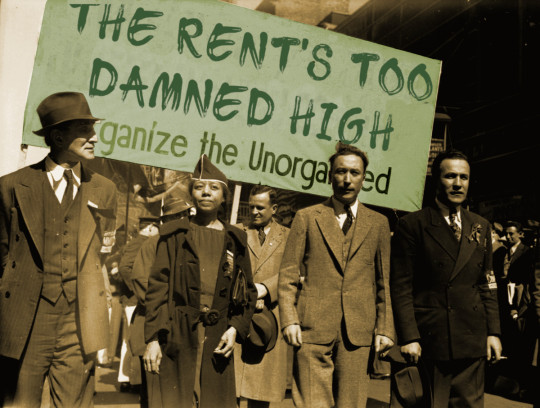
There's a reason Reagan declared war on unions before he declared war on everything else – environmental protection, health care, consumer rights, financial regulation. Unions are how working people fight for a better world for all of us. They're how everyday people come together to resist oligarchy, extraction and exploitation.
Take the 2019 LA teachers' strike. As Jane McAlevey writes in A Collective Bargain, the LA teachers didn't just win higher pay for their members! They also demanded (and got) an end to immigration sweeps of parents waiting for their kids at the school gate; a guarantee of green space near every public school in the city; and on-site immigration counselors in LA schools:
https://pluralistic.net/2023/04/23/a-collective-bargain/
Unionization is enjoying an historic renaissance. The Hot Labor Summer transitioned to an Eternal Labor September, and it's still going strong, with UAW president Shawn Fain celebrating his members victory over the Big Three automakers by calling for a 2028 general strike:
https://www.teenvogue.com/story/uaw-general-strike-no-class
The rising labor movement has powerful allies in the Biden Administration. NLRB general counsel Jennifer Abruzzo is systematically gutting the "union avoidance" playbook. She's banned the use of temp-work app blacklists that force workers to cross picket lines:
https://pluralistic.net/2023/07/30/computer-says-scab/#instawork
She's changed the penalty for bosses who violate labor law during union drives. It used to be the boss would pay a fine, which was an easy price to pay in exchange for killing your workers' union. Now, the penalty is automatic recognition of the union:
https://pluralistic.net/2023/09/06/goons-ginks-and-company-finks/#if-blood-be-the-price-of-your-cursed-wealth
And while the law doesn't allow Abruzzo to impose a contract on companies that refuse to bargain their unions, she's set to force those companies to honor other employers' union contracts until they agree to a contract with their own workers:
https://onlabor.org/gc-abruzzo-just-asked-the-nlrb-to-overturn-ex-cell-o-heres-why-that-matters/
She's also nuking TRAPs, the deals that force workers to repay their employers for their "training expenses" if they have the audacity to quit and get a better job somewhere else:
https://pluralistic.net/2023/09/14/prop-22-never-again/#norms-code-laws-markets
(As with every aspect of the Biden White House, its labor policy is contradictory and self-defeating, with other Biden appointees working to smash worker power, including when Biden broke the railworkers' strike:)
https://pluralistic.net/2023/09/18/co-determination/#now-make-me-do-it
A surging labor movement opens up all kinds of possibilities for a better world. Writing for the Law and Political Economy Project, UNITE Here attorney Zoe Tucker makes the case for unions as a way out of America's brutal housing crisis:
https://lpeproject.org/blog/why-unions-should-join-the-housing-fight/
She describes how low-waged LA hotel workers have been pushed out of neighborhoods close to their jobs, with UNITE Here members commuting three hours in each direction, starting their work-days at 3AM in order to clock in on time:
https://twitter.com/MorePerfectUS/status/1669088899769987079
UNITE Here members are striking against 50 hotels in LA and Orange County, and their demands include significant cost-of-living raises. But more money won't give them back the time they give up to those bruising daily commutes. For that, unions need to make housing itself a demand.
As Tucker writes, most workers are tenants and vice-versa. What's more, bad landlords are apt to be bad bosses, too. Stepan Kazaryan, the same guy who owns the strip club whose conditions were so bad that it prompted the creation of Equity Strippers NoHo, the first strippers' union in a generation, is also a shitty landlord whose tenants went on a rent-strike:
https://pluralistic.net/2023/05/20/the-missing-links/#plunderphonics
So it was only natural that Kazaryan's tenants walked the picket line with the Equity Stripper Noho workers:
https://twitter.com/glendaletenants/status/1733290276599570736?s=46
While scumbag bosses/evil landlords like Kazaryan deal out misery retail, one apartment building at a time, the wholesale destruction of workers' lives comes from private equity giants who are the most prolific source of TRAPs, robo-scabbing apps, illegal union busting, and indefinite contract delays – and these are the very same PE firms that are buying up millions of single-family homes and turning them into slums:
https://pluralistic.net/2022/02/08/wall-street-landlords/#the-new-slumlords
Tucker's point is that when a worker clocks out of their bad job, commutes home for three hours, and gets back to their black-mold-saturated, overpriced apartment to find a notice of a new junk fee (like a surcharge for paying your rent in cash, by check, or by direct payment), they're fighting the very same corporations.
Unions who defend their workers' right to shelter do every tenant a service. A coalition of LA unions succeeded in passing Measure ULA, which uses a surcharge on real estate transactions over $5m to fund "the largest municipal housing program in the country":
https://unitedtohousela.com/app/uploads/2022/05/LA_City_Affordable_Housing_Petition_H.pdf
LA unions are fighting for rules to limit Airbnbs and other platforms that transform the city's rental stock into illegal, unlicensed hotels:
https://upgo.lab.mcgill.ca/publication/strs-in-los-angeles-2022/Wachsmuth_LA_2022.pdf
And the hotel workers organized under UNITE Here are fighting their own employers: the hoteliers who are aggressively buying up residences, evicting their long-term tenants, tearing down the building and putting up a luxury hotel. They got LA council to pass a law requiring hotels to build new housing to replace any residences they displace:
https://www.latimes.com/california/story/2023-11-28/airbnb-operators-would-need-police-permit-in-l-a-under-proposed-law
UNITE Here is bargaining for a per-room hotel surcharge to fund housing specifically for hotel workers, so the people who change the sheets and clean the toilets don't have to waste six hours a day commuting to do so.
Labor unions and tenant unions have a long history of collaboration in the USA. NYC's first housing coop was midwifed by the Amalgamated Clothing Workers of America in 1927. The Penn South coop was created by the International Ladies Garment Workers’ Union. The 1949 Federal Housing Act passed after American unions pushed hard for it:
http://www.peterdreier.com/wp-content/uploads/2014/07/Labors-Love-Lost.pdf
It goes both ways. Strong unions can create sound housing – and precarious housing makes unions weaker. Remember during the Hollywood writers' strike, when an anonymous studio ghoul told the press the plans was to "allow things to drag on until union members start losing their apartments and losing their houses?"
Vienna has the most successful housing in any major city in the world. It's the city where people of every income and background live in comfort without being rent-burdened and without worry about eviction, mold, or leaks. That's the legacy of Red Vienna, the Austrian period of Social Democratic Workers' Party rule and built vast tracts of high-quality public housing. The system was so robust that it rebounded after World War II and continues to this day:
https://www.politico.eu/article/vienna-social-housing-architecture-austria-stigma/
Today, the rest of the world is mired in a terrible housing crisis. It's not merely that the rent's too damned high (though it is) – housing precarity is driving dangerous political instability:
https://pluralistic.net/2021/06/06/the-rents-too-damned-high/
Turning the human necessity of shelter into a market commodity is a failure. The economic orthodoxy that insists that public housing, rent control, and high-density zoning will lead to less housing has failed. rent control works:
https://pluralistic.net/2023/05/16/mortgages-are-rent-control/#housing-is-a-human-right-not-an-asset
Leaving housing to the market only produces losers. If you have the bad luck to invest everything you have into a home in a city that contracts, you're wiped out. If you have the bad luck into invest everything into a home in a "superstar city" where prices go up, you also lose, because your city becomes uninhabitable and your children can't afford to live there:
https://pluralistic.net/2021/09/27/lethal-dysfunction/#yimby
A strong labor movement is the best chance we have for breaking the housing deadlock. And housing is just for starters. Labor is the key to opening every frozen-in-place dysfunction. Take care work: the aging, increasingly chronically ill American population is being tortured and murdered by private equity hospices, long-term care facilities and health services that have been rolled up by the same private equity firms that destroyed work and housing:
https://pluralistic.net/2023/04/26/death-panels/#what-the-heck-is-going-on-with-CMS
In her interview with Capital & Main's Jessica Goodheart, National Domestic Workers Alliance president Ai-jen Poo describes how making things better for care workers will make things better for everyone:
https://prospect.org/labor/2023-12-13-labor-leader-ai-jen-poo-interview/
Care work is a "triple dignity investment": first, it makes life better for the worker (most often a woman of color), then, it allows family members of people who need care to move into higher paid work; and of course, it makes life better for people who need care: "It delivers human potential and agency. It delivers a future workforce. It delivers quality of life."
The failure to fund care work is a massive driver of inequality. America's sole federal public provision for care is Medicaid, which only kicks in after a family it totally impoverished. Funding care with tax increases polls high with both Democrats and Republicans, making it good politics:
https://www.dataforprogress.org/blog/2021/4/7/voters-support-investing-in-the-care-economy
Congress stripped many of the care provisions from Build Back Better, missing a chance for an "unprecedented, transformational investment in care." But the administrative agencies picked up where Congress failed, following a detailed executive order that identifies existing, previously unused powers to improve care in America. The EO "expands access to care, supports family caregivers and improves wages and conditions for the workforce":
https://www.whitehouse.gov/briefing-room/presidential-actions/2023/04/18/executive-order-on-increasing-access-to-high-quality-care-and-supporting-caregivers/
States are also filling the void. Washington just created a long-term care benefit:
https://apnews.com/article/washington-long-term-care-tax-disability-cb54b04b025223dbdba7199db1d254e4
New Mexicans passed a ballot initiative that establishes permanent funding for child care:
https://www.cwla.org/new-mexico-votes-for-child-care/
New York care workers won a $3/hour across the board raise:
https://inequality.org/great-divide/new-york-budget-fair-pay-home-care/
The fight is being led by women of color, and they're kicking ass – and they're doing it through their unions. Worker power is the foundation that we build a better world upon, and it's surging.

If you'd like an essay-formatted version of this post to read or share, here's a link to it on pluralistic.net, my surveillance-free, ad-free, tracker-free blog:
https://pluralistic.net/2023/12/13/i-want-a-roof-over-my-head/#and-bread-on-the-table
#pluralistic#labor#hot labor summer#eternal labor september#jane mcalevey#los angeles#weaponized shelter#housing#airbnb#equity strip noho#tenants unions#red vienna#jennifer abruzzo#nlrb#the rent's too damned high
1K notes
·
View notes
Text
Today was a big for the resistance. It seems people were right, they were waiting for Biden to leave so they can respond to the Ah Ahli Hospital massacre (the tweets below are arranged from the earliest reports I saw to the latest in order to show the coordination between different groups in different countries and the escalation)
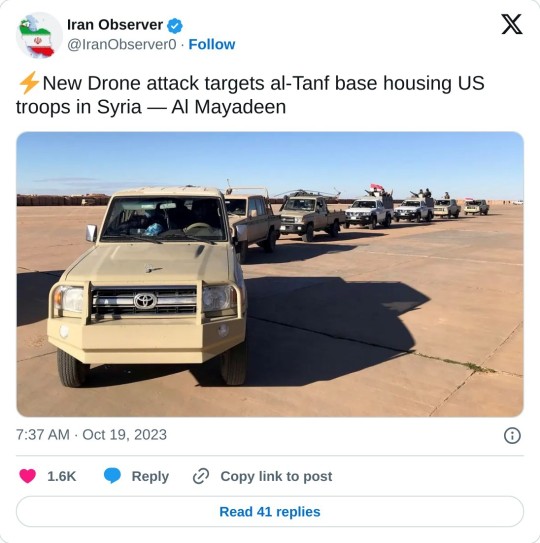
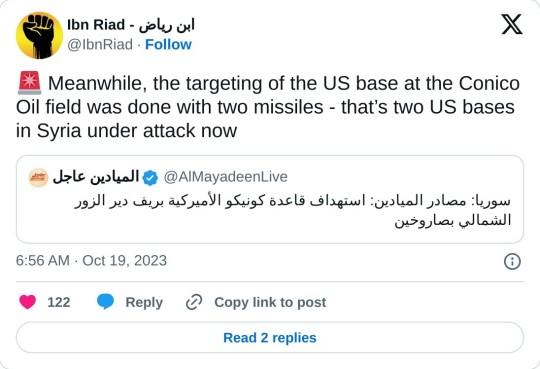
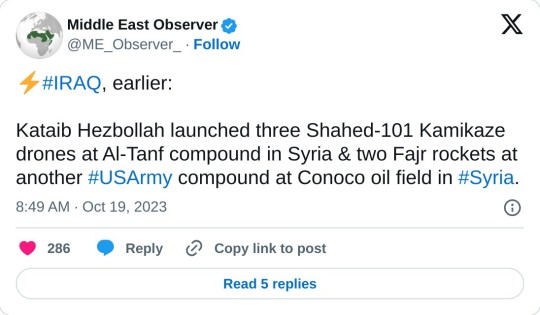
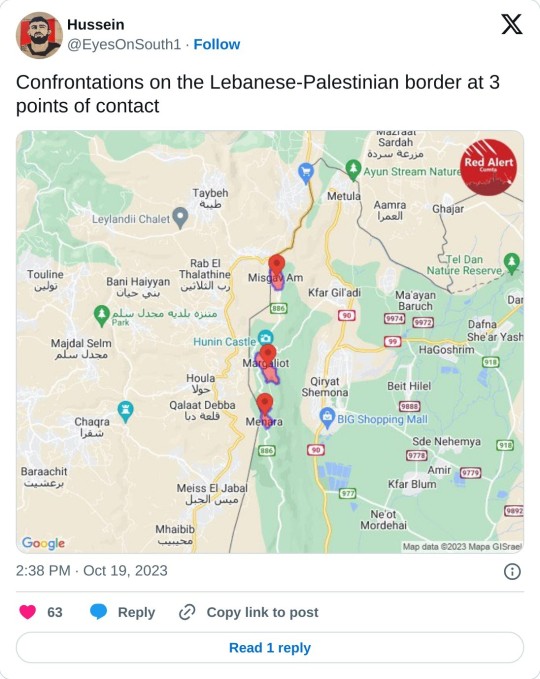

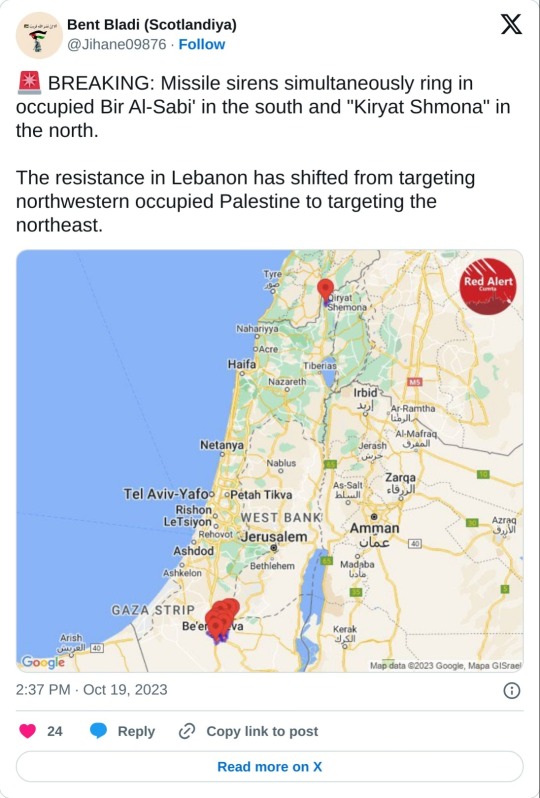
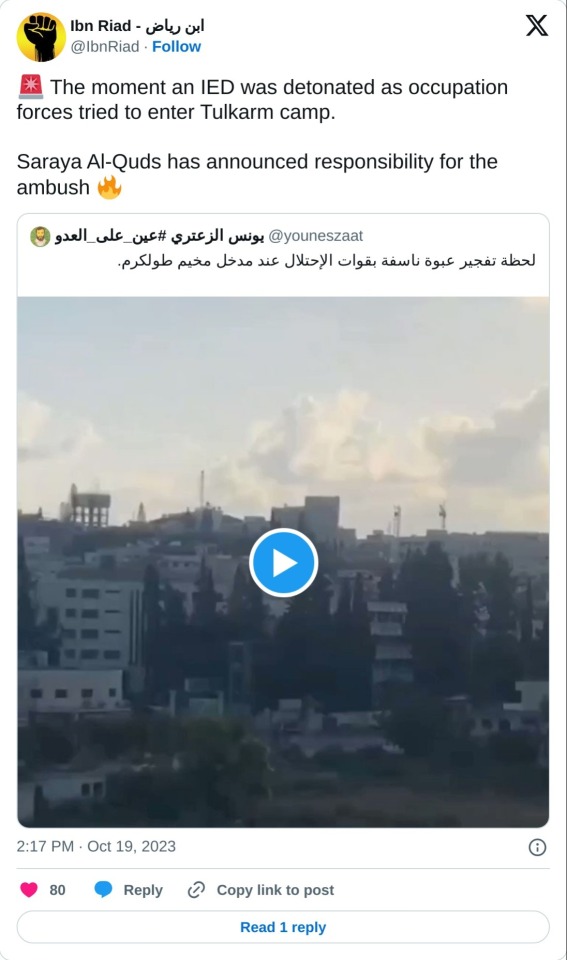

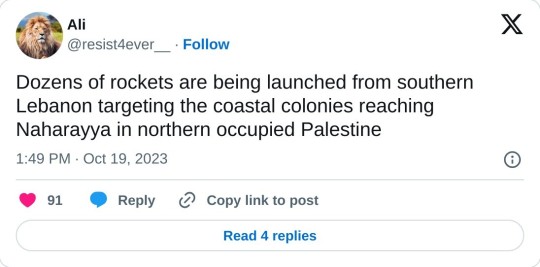
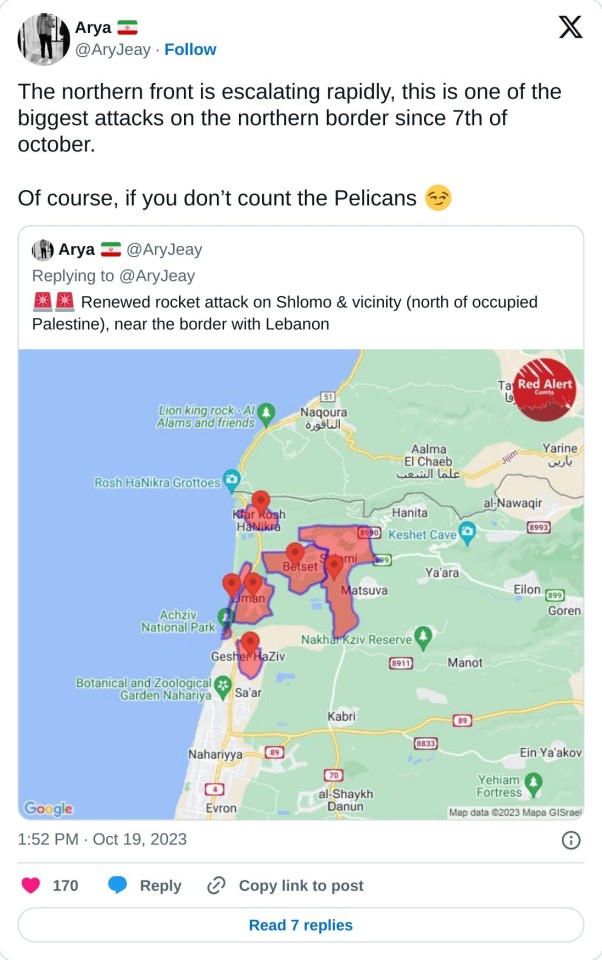
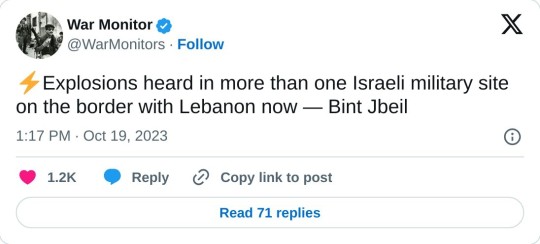
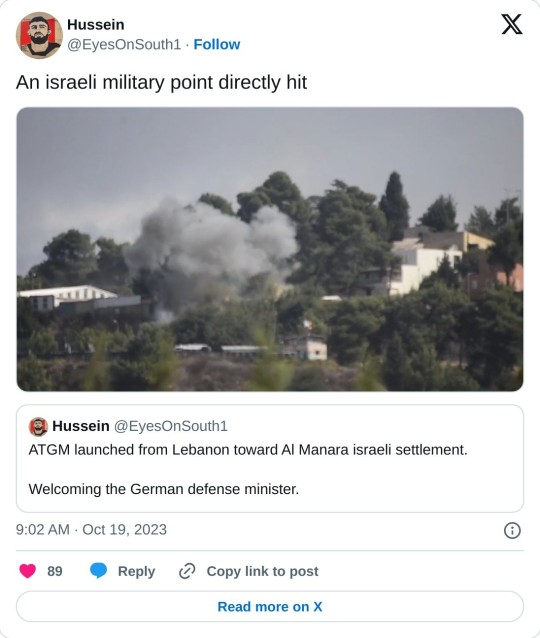
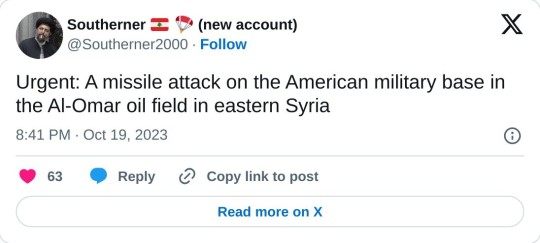

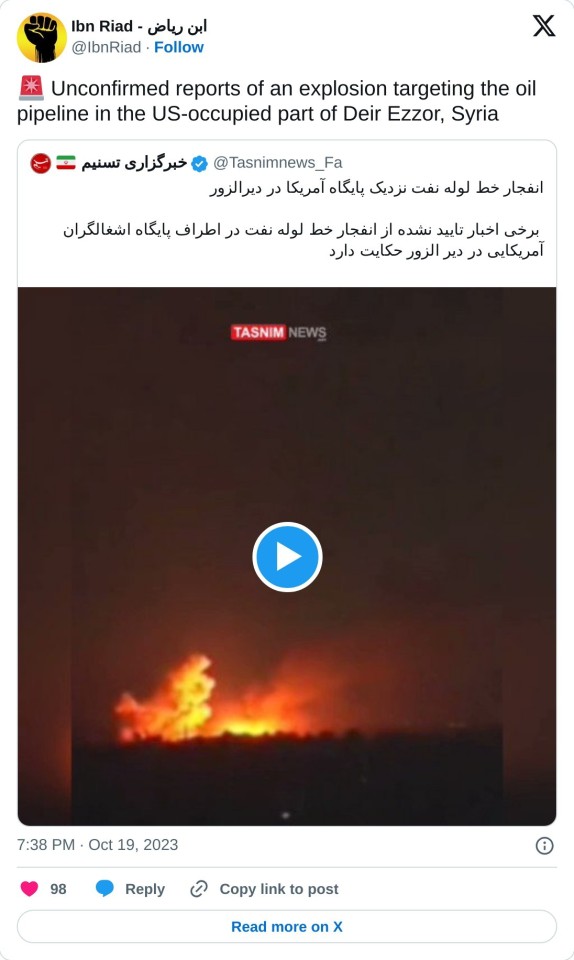
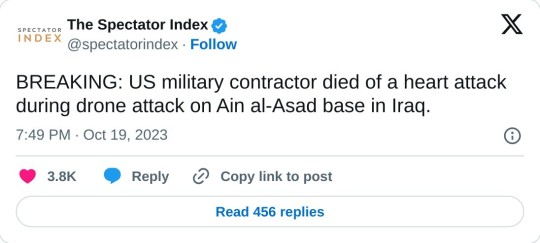
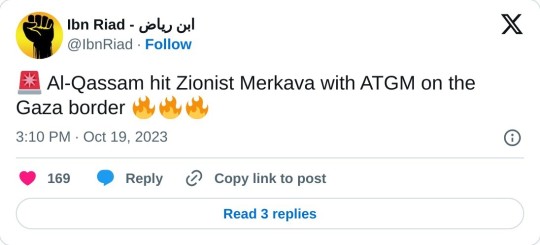
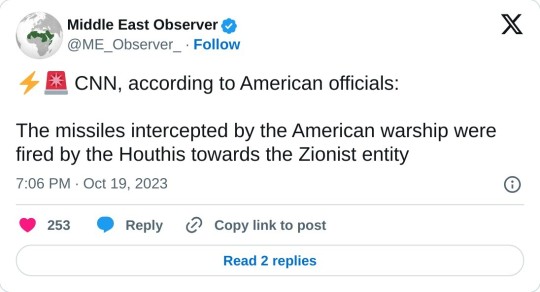
Like I said, a big day for the resistance
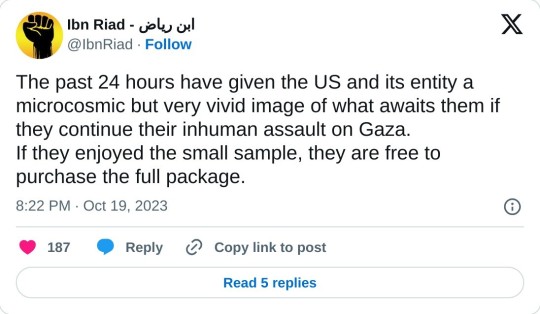
And I see no signs of things slowing down
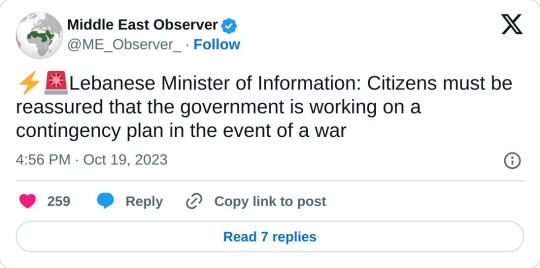
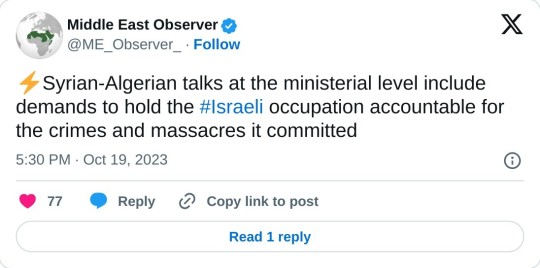
The Palestinian resistance has a list of objectives for this operation including damaging Israel's economy, forcing Israel citizens to flee the country, and slowing down immigration to Israel in the long term (because that leads to new settlements)
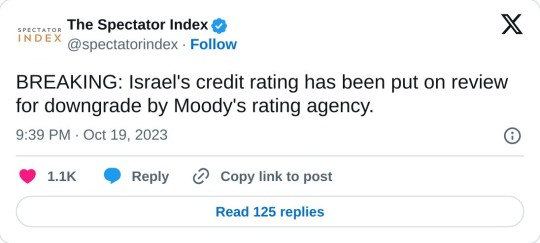
In other news, Biden's bloodlust was enough to disgust an arms dealer.
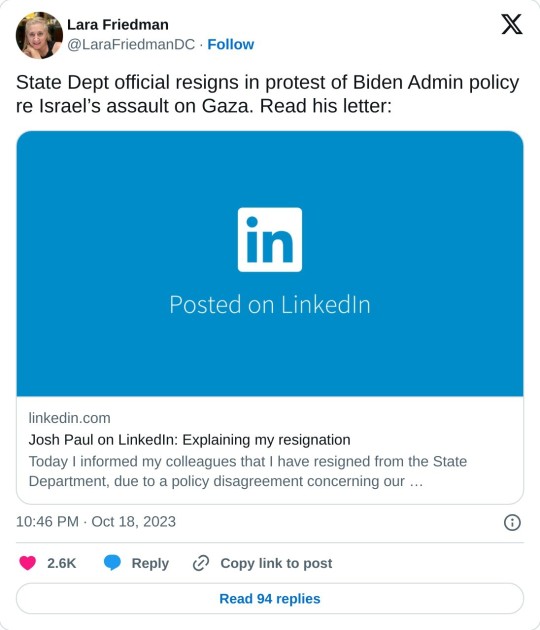
Several of his staff have also expressed discomfort with the administration's choices the past few weeks
Nonetheless, American troops have been told to prepare for deployment
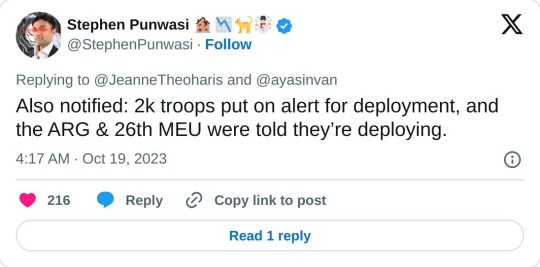
The past few days I've been pointing out how Russia has gone from pro Israel to carefully neutral to increasingly critical of Israel and now we have this.
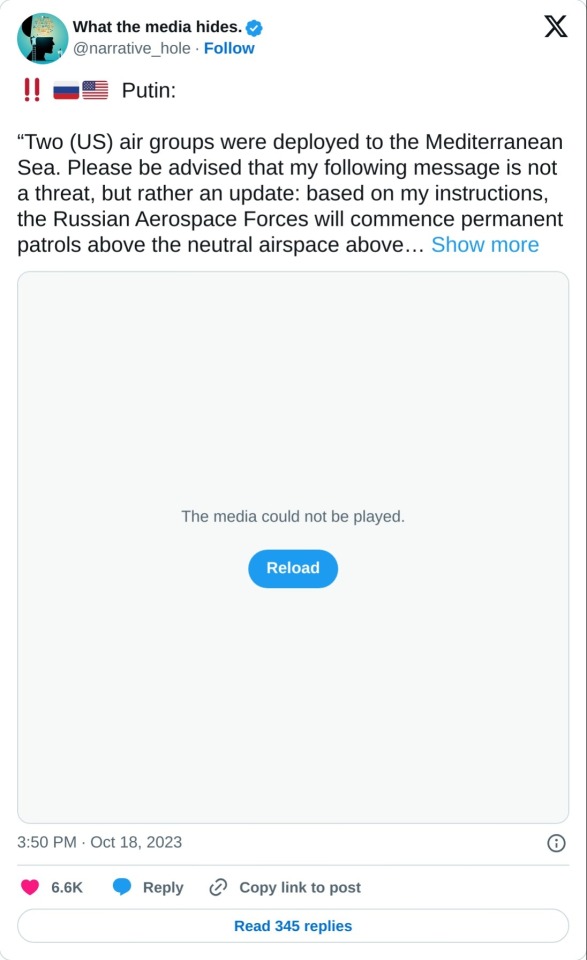
I'm so glad that Israel has continued to shoot itself on its foot by isolating itself from Russia and China
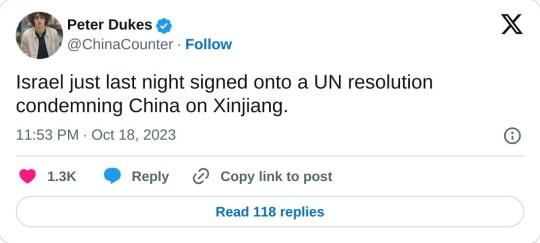
Russia is actively intervening to ensure that America and its allies can't use the Black Sea to counter the resistance in West Asia which is a big deal
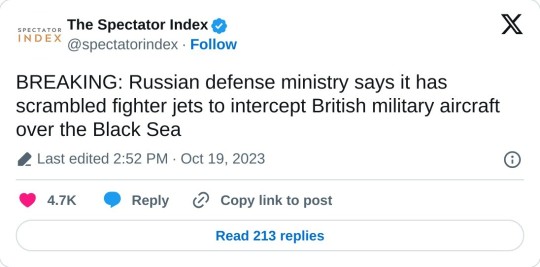
So far, all signs are pointing to a regional conflict
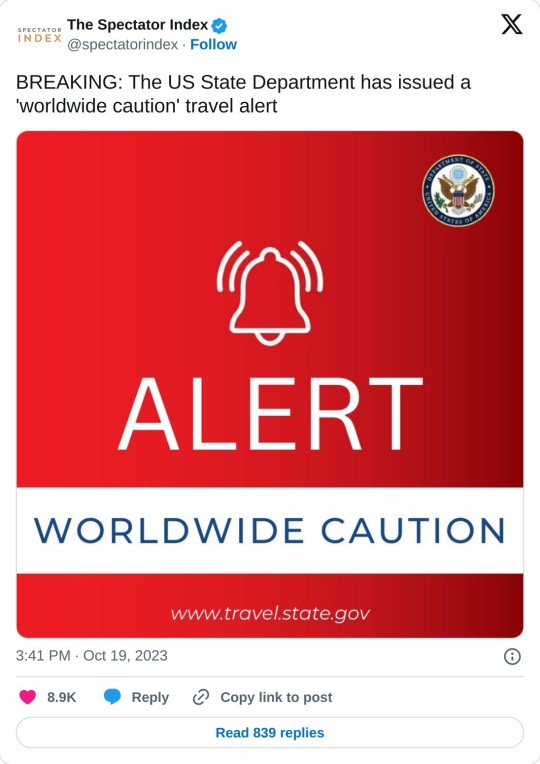
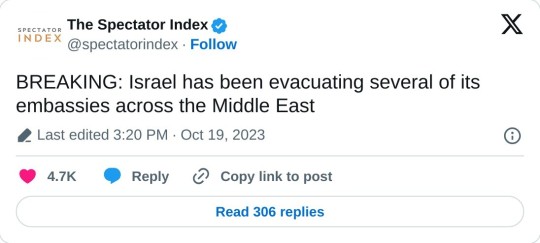
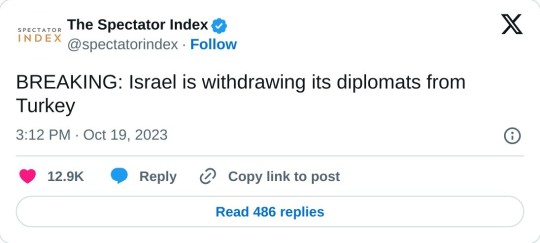
This has to be a huge blow to Israel seeing so many countries, even a NATO nation, coming together to ensure that it can't annihilate Palestine.
More importantly, it shows that Palestine does not stand alone.
1K notes
·
View notes
Note
I'm pretty pessimistic about attempts to dissuade the United States from bankrolling Israel's atrocities. I'm to young to remember much of Iraq but I know we did this whole song and dance then and nothing changed it still happened an a lot of people died. This is not really a pessimism I can voice to any of my friends as we are all struggling to figure out how to resist. I'm voicing this to you because I've long enjoyed your blog and consider your writing to be principled will still empathic and that is very important.
Behind the scenes, American officials also believe there is limited time for Israel to try to accomplish its stated objective of taking out Hamas in its current operation before uproar over the humanitarian suffering and civilian casualties – and calls for a ceasefire – reaches a tipping point.
In fact, there is recognition within the administration that that moment may arrive quickly: Some of the president’s close advisers believe that there are only weeks, not months, until rebuffing the pressure on the US government to publicly call for a ceasefire becomes untenable, sources told CNN.
Even aside from the above, I think Palestinian solidarity rn is in a pretty different position from the antiwar movement in the lead up to Iraq. Iraq was the culmination of decades of neoconservative organising with the invasion as its end goal; the current aid to Israel is a response to an increasingly inconvenient and unruly ally, with whom the current administration (odious as it is) is already expressing frustration. The support for the iraq war among mainstream pundits and officials was virtually unanimous; already we are witnessing dissent on the Gaza war reach high places. And most importantly, the protests against iraq were comparatively narrowly focused and time-bound, while the campaign for Palestinian liberation is a decades long international movement that has made real strides, especially in the U.S. The same kind of international movement that eventually helped the ANC to bring down apartheid in South Africa. There’s some room here for optimism of the intellect as well as of the will
1K notes
·
View notes
Note
Obviously Hamas actions are abhorrent and the rise in antisemitism is uncalled for. What is the proper the response to 75yrs of apartheid though? Something has to be done about that or his cycle will never cease.
So you came from the post in which I explicitly named three organizations working for a two-state solution. And didn’t think… to look into… their proposals for a two-state solution…
As a reminder, before Hamas’s attack, Israel was working on normalizing peaceful relations with Saudi Arabia. That’s dead in the water because Hamas broke a ceasefire and killed a thousand Jewish civilians.
Before Hamas’s attack, there were massive, frequent, and often daily protests among the Israeli public, speaking out against an administration comprised of anti-Palestinians. Those are on hold now, because a thousand Jewish civilians were killed, and the country is at war. But Netanyahu’s coalition of asswipes is built like a house of cards, and they’ll suffer in the next election. That much is clear.
Hamas wasn’t looking to gain territory, win, or free Palestine on October 7th. Israel has never lost a war in its modern history, and it has overcome far worse odds than a couple thousand terrorists. There’s no feasible way for Hamas to have won. They broke the ceasefire and killed civilians anyway. Why? Why waste those lives and those resources, knowing that Israel would retaliate against Gazans?
Because Hamas looked around and saw something that horrified them. They saw Arab nations, once their allies, walking away from the idea of killing millions of Jews in favor of normalization and peace with Israel. They saw the citizens of Israel, rallying in unprecedented numbers for peace and democracy. They saw Fatah, their Palestinian enemies since 2007, ready to come back to the bargaining table for a peaceful two-state resolution.
Hamas broke a ceasefire for a media ploy. They did it, knowing that it would stop the normalization process between the Saudis and Israelis. They did it, knowing that it would bring an abrupt halt to Israeli protests. They did it, knowing that Israel would retaliate, and that the world would be watching as Hamas put Palestinian civilians in the line of fire and blamed it on Israel. They were looking to propagandize a dying movement, and friend, it seems like you bought into it.
Something does have to be done about Israeli’s treatment of Palestinians. Something does have to happen to end this cycle of violence. And plenty of things were being done about it, in the Knesset, on the streets of Jerusalem and Tel Aviv. But Hamas considers peace without genocide to be a failure. Peace without genocide leaves Hamas out of a job. So they put a stop to it, at the cost of hundreds of thousands of Palestinian lives.
And you don’t gotta take that from me. Ask them. They aren’t trying to hide it, they’ve been saying it all month. It’s in their founding charter.
869 notes
·
View notes
Text
(Oct. 26) The White House is deliberately smearing the Gazan Ministry of Health's reports of the death toll in Gaza as means of genocidal denial, saying that the "'so-called' Ministry of Health is [...] not reliable." But the Biden Administration has cited the Ministry of Health as recently as last year.
This is not the first time the United States has engaged in genocide denial on behalf of an ally.
Highlighted on Twitter, from The Representation of the Holocaust in the Soviet Press, 1941–1945 by Corinne Ducey (pub. 2008) [Link] (Sci-Hub)
The American and British press also shared a widespread mistrust of Jewish eye- witnesses. Although the Anglophone press reported on stories released by the Soviets or smuggled reports from Jews trapped in Eastern Europe, these stories were ‘not worthy of complete trust because Jews were “interested parties”’. The press tended to believe non-Jewish sources over Jewish sources and ‘generally during these years, whenever the Pope or other leading Christian religious leaders spoke out on the Jews’ behalf [. . .] their comments garnered more attention than a similar story coming from a Jewish [. . .] source’. As late as January 1945 an official from the Refugee Department of the British Foreign Office wrote, ‘Sources of information are nearly always Jewish whose accounts are only sometimes reliable and not seldom highly coloured. One notable tendency in Jewish reports on this problem is to exaggerate the numbers of deportations and deaths’.
In November 1943, W. H. Lawrence of the New York Times travelled to Kiev for an inspection of Babi Yar after the Soviets had retaken the city, and filed a sceptical story about the massacre. The article includes phrases such as ‘it is the contention of the authorities’ and, when referring to eyewitnesses, ‘who said they participated’ or ‘the story was told by’. Lawrence visited the ravine personally, but still found it difficult to accept the Soviet version of events. He states that he saw only a bone or two, a handbag, some hair and ‘that there is little evidence in the ravine to prove or disprove the story’. He therefore concludes that ‘On the basis of what we saw, it is impossible for this correspondent to judge the truth or falsity of the story told to us’. Alexander Werth notes in his book about his experiences with the Red Army, Russia at War, that the BBC turned down his report on Majdanek because they could not believe that Nazi Germany had taken its racial policies so far. Werth also quotes the response of the New York Herald Tribune to the report on Majdanek: ‘Maybe we should wait for further corroboration of the horror story that comes from Lublin. Even on top of all we have been taught of maniacal Nazi ruthlessness, this example sounds inconceivable.’
The Ministry of Health has published the names of over 7,000 Palestinians, including almost 3,000 children, killed in Gaza. The full report can be found here.
646 notes
·
View notes
Text
PFLP statement via RNN:
“Today, Tuesday, the Popular Front for the Liberation of Palestine denounces any Arab or Palestinian participation in meetings with the American war criminal Joe Biden, the main driver of the war of genocide against our steadfast people in the Gaza Strip.
The blood of the innocent martyrs in the [Al-Ahli Arab] Al-Maamadani Hospital massacre committed by the zionist enemy drips from the hands of the American war criminal Joe Biden and his zionist allies.
The decision to bomb the hospital was issued by the same zionist war room in which the criminal Joe Biden was present today during his visit to his war criminal allies.
These massacres, which exceeded any other, were the result of the inherent racist criminal tendencies of the leaders of the zionist entity and their allies in the American administration and the leadership of the European Union.
The minimum respect for Arab dignity and identity is for Arab officials to adopt a unified stance by withdrawing from the summit of shame with Biden, the killer of children, women, and the elderly; to boycott the American administration; to expel its military bases; and to close its embassies in the region. This must of course be preceded by a complete closure of the embassies of the state of aggression and zionist war crimes.
The Front calls on the masses of our people in the West Bank, Al-Quds, and the territories of 1948 to move and ignite a comprehensive intifada in the face of this criminal enemy and the herds of its settlers who are committing massacres against our people and our people in the Gaza Strip.
The Front also calls on the Arab masses to besiege the American embassies, the embassies of the European Union countries and the zionist entity, and their representative offices in all Arab capitals. It also addresses the same call to the forces around the world in solidarity with our people, to escalate actions and struggles against the aggression and against the embassies of the zionist entity, the American administration, and the European powers that are partners in this aggression.
This is the battle of Palestinian existence, Arab existence, and dignity. Half-hearted positions in it cannot be accepted. Our people will remain steadfast, proud, and tall, defending their land and their rights, the dignity of the Arab nation and the essence of its existence.”
669 notes
·
View notes
Text
[The Economist is Private UK Media]
Making someone do porridge (or “eat rice and beans”, to use the Korean expression) for expressing their political views is [...] not generally associated with [South Korea]. Yet Lee Yoon-seop, a South Korean poet, is currently languishing in prison for just this. The 68-year-old was sentenced to 14 months in November for threatening South Korea’s “existence and security”. His crime? Writing a poem in praise of the North.
The law used to prosecute Mr Lee, the National Security Act (nsa), is designed to protect South Korea from spies and traitors. But it also bans South Koreans from visiting or making contact with the North, reading or watching North Korean media or saying anything good about Kim Jong Un’s [...] regime. Though South Korea replaced its former military dictatorship with a democracy in 1987, such restrictions on free speech show that some of the generals’ autocratic tendencies endure.[...]
The NSA was modelled on a law designed to quash pro-independence activities during Japan’s occupation of Korea from 1910 to 1945. Since 2003 there have on average been more than 60 NSA prosecutions a year, often for pretty clear espionage cases. A businessman and an army officer were arrested for allegedly selling military secrets to North Korea. Soldiers in the South have been prosecuted under the act for endangering morale by distributing pro-North propaganda.
But the NSA is too often used to prosecute satirists and raid the homes and offices of leftists. Some cases have been ridiculous. Kim Myeong-soo, a PhD student, received six months in prison and a two-year suspended sentence for selling books on North Korea that were widely available in public libraries. A South Korean woman was given a two-year sentence, suspended for four years, for owning recordings of 14 North Korean songs.
This is not Mr Lee’s first offence. But the claim that the sexagenarian posed a threat to South Korea is absurd. His ode was published on a North Korean website. Access to such sites is banned by the NSA and forbidden from a South Korean IP address. [...] It consists of a list of South Korean problems that Mr Kim, in the poet’s view, would instantly solve given the chance.
Mr Lee’s real offence appears to have been believing his own nonsense. By contrast, police decided not to investigate a man under the draconian law for selling shirts with a smiling Mr Kim and the slogan “Walk a flowery path, comrade”. That was OK, officials said, because he was selling them to make a buck.
Worse, the issue points to a broader authoritarian tendency in the South. Its president, Yoon Suk-yeol, often demonises his political opponents by calling them “anti-state forces”, a phrase lifted directly from the NSA. Unfavourable press coverage is routinely labelled “fake news” and the offices of offending outlets have been raided. The administration and its allies have sued more press outfits for defamation—which in South Korea can be a crime even when the offending words are manifestly true—in Mr Yoon’s first 18 months in office than any of its three predecessors did in total.
Yet even a more liberal government would be unlikely to remove the NSA’s illiberal clauses. No administration has made a serious attempt to address it in 20 years. There is no significant political support for scrapping the law [...]. The current administration at least flirted with allowing South Koreans access to North Korean media, but recently abandoned the idea. [...]
Mr Yoon talks often about South Korea’s democratic values. They are at the heart of his pitch for the country to be a strategic link between East and West, developed and developing countries. For that reason alone he should take them more seriously. South Korea is undoubtedly a democracy, but not a terribly liberal one so long as it locks up old men for their dotty opinions. Reforming the NSA would be a better rebuttal to the sentiment Mr Lee expressed than banning it.
22 Jan 24
515 notes
·
View notes
Text
Some of Joe Biden’s accomplishments:
**Domestic policy**
* **American Rescue Plan (2021)**: Provided $1.9 trillion in COVID-19 relief, including direct payments, enhanced unemployment benefits, and funding for vaccines and testing.
* **Infrastructure Investment and Jobs Act (2021)**: Allocated $1.2 trillion for infrastructure projects, including roads, bridges, broadband, and clean energy initiatives.
* **Bipartisan Safer Communities Act (2022)**: Expanded background checks for gun purchases and provided funding for mental health services.
* **Child Tax Credit Expansion (2021-2022)**: Temporarily expanded the Child Tax Credit to provide up to $3,600 per child in monthly payments.
* **Affordable Care Act Expansion (2021)**: Made health insurance more affordable for low- and middle-income Americans by reducing premiums and expanding subsidies.
**Foreign Policy**
* **Withdrawal from Afghanistan (2021)**: Ended the 20-year war in Afghanistan.
* **Re-joining the Paris Agreement (2021)**: Re-committed the United States to global efforts to address climate change.
* **Strengthening Alliances with NATO and the EU (2021-present)**: Repaired relationships with key European allies after strained relations during the Trump administration.
* **Supporting Ukraine in the Ukraine-Russia War (2022-present)**: Provided military, humanitarian, and diplomatic support to Ukraine in its defense against Russia's invasion.
* **Nuclear Deal with Iran (2023)**: Revived negotiations with Iran on a comprehensive nuclear deal, aimed at preventing Iran from developing nuclear weapons.
**Other Notable Accomplishments**
* **Appointing Ketanji Brown Jackson to the Supreme Court (2022)**: Made history by being the first Black woman appointed to the nation's highest court.
* **Signing the Respect for Marriage Act (2022)**: Ensured federal recognition of same-sex and interracial marriages.
* **Establishing the Office of the National Cyber Director (2021)**: Coordinated federal efforts to combat cybersecurity threats.
* **Creating the COVID-19 National Preparedness Plan (2021)**: Developed a comprehensive strategy to respond to future pandemics.
* **Launching the Cancer Moonshot (2022)**: Re-energized the government's efforts to find a cure for cancer.
170 notes
·
View notes
Text
Since the start of the Israel-Hamas war, the Biden administration has tried to toe a delicate line: backing Israel’s war against the group in Gaza, while pushing Israel to ease the humanitarian toll of its operations and take the Palestinians’ legitimate political grievances seriously. By all accounts, toeing this line has been a frustrating and thankless endeavor—and, increasingly, a lonely one. Today, even the United States’ closest allies are calling for an “immediate ceasefire” that would put an end to Israel’s operations in Gaza. At home, the White House is facing increasing pressure from Democrats in the U.S. Congress and parts of the Democratic base to change its current tactics in dealing with Israel.
And yet, what the Biden administration understands—and what Israel’s many critics miss—is that the international community cannot dictate a solution to Israel-Hamas war by fiat. If the international community wants Israel to change strategies in Gaza, then it should offer a viable alternative strategy to Israel’s announced goal of destroying Hamas in the strip. And right now, that alternate strategy simply does not exist.
There is a brutal logic to Israel’s actions in Gaza. By its own estimates, Israel has destroyed three-quarters of Hamas’ battalions and killed two of five brigade commanders, 19 of 24 battalion commanders, more than 50 platoon leaders, and 12,000 of Hamas’ 30,000 foot soldiers. American intelligence estimates are lower, but not by much: Between 20 to 30 percent of Hamas’ fighters and 20 to 40 percent of its tunnels are estimated to have been destroyed as of mid-January. It’s also worth remembering that Hamas is structured more like a conventional military than a pure terrorist group. As a rule of thumb, conventional forces are considered combat ineffective once they lose more than 30 percent of their strength and destroyed once they lose 50 percent.
Even if Israel does not stamp out Hamas entirely but merely succeeds in driving it out of power and underground, from Israel’s view, that is still a win—even if stops well short of its goal of destroying the group, for doing so would likely prove sufficient to prevent Hamas from launching another 3,000-man complex assault like the one Israel saw on Oct. 7. Finally, it’s worth remembering that it took the United States several years to defeat the Islamic State. Israel is just over five months into what its leaders promised will be a very long war.
To be sure, there are serious drawbacks to the Israeli approach. This war will encourage long-term radicalization of the Palestinian population, damage Israel’s relationship with its Arab neighbors, and tarnish Israel’s global reputation in a pretty serious way. Yet all of these problems are long term. Too often, states and politics live in the here and now.
At the same time, Israel’s critics have failed—and continue to fail—to offer a coherent alternative way forward. Instead, more often than not, there are vague references for the need for some ill-defined “political solution” to the conflict. To the extent that there is a coherence to this alternate strategy, it revolves around using the threat of diplomatic isolation alongside economic threats that might force Israel to agree to an “immediate ceasefire.” That ceasefire, in turn, would pave the way for a longer-term political settlement, likely around a two-state solution. Problem solved. Or not.
For starters, international pressure and sanctions will not likely compel Israel to compromise. Israelis from the leadership on down are keenly aware that their country was born out of the ashes of Holocaust as a safe-haven for Jews after millennia of persecution. Israel then spent its first quarter-century fighting for its very existence. The idea that the world is aligned against Israel is deeply embedded in the nation’s collective DNA, and chants of “from the river to the sea,” coupled with surging global antisemitism, only ensure that those fears remain very much alive today.
Economic pressure—such as sanctioning settlers or restricting military aid—is unlikely to work, either. In general, sanctions have a poor track record of compelling states to abandon core national security interests. And given the Oct. 7 attacks, this war is nothing if not a core national security interest for Israel. Even if pressure did work initially, for a political solution to be sustainable, Israelis must voluntarily agree, not be pressured into it.
But let’s just say, for the sake of argument, that Israel caved to outside pressure and agreed to an immediate ceasefire. What would the day after look like? Hamas—as Israel and Hamas both acknowledge—would be left with a considerable military force, numbering in the thousands. Israel would then need to engage in another very lopsided deal to free the remaining hostages. In early February, Hamas wanted 1,500 prisoners freed from Israeli jails, including at least 500 serving life sentences for murder and other crimes, in exchange for the hostages.
So, at minimum, the group’s ranks would soon swell. And invariably, some of those released would be quite dangerous. After all, Yahya Sinwar—the head of Hamas in Gaza and alleged mastermind of the Oct. 7 attacks—was freed from an Israeli prison, where he was serving a life sentence for murder, in the 2011 trade of 1,027 prisoners for one captured Israeli soldier, Gilad Shalit. None of this recent history bodes particularly well for long-term peace.
In all likelihood, Israel would respond to a ceasefire by tightening its blockade of Gaza, citing Hamas’ continued existence as one reason for doing so. In particular, Israel would likely put severe limits on the quantities and types of building materials allowed into the Strip. After all, Hamas diverted an estimated 1,800 tons of steel and 6,000 tons of concrete to build its tunnel networks, and Israel would not want to see them rebuilt. The net consequence would be that desperately needed reconstruction would be severely delayed or even brought to standstill.
The fighting would not stop, either. Fearing that Hamas will make good on its promise to repeat the Oct. 7 attack “again and again,” Israel would step up its preemptive strikes on Gaza and the West Bank, particularly whenever it got the first whiff that Hamas might be planning an attack. At the same time, Hamas would continue to attack Israel, if only to reinforce its legitimacy and divert attention away from the likely dismal conditions in Gaza (thanks, in no small part, to the stymied reconstruction effort). In all likelihood, the situation would be right back where it started.
Ah, but wait: Won’t a two-state solution solve this? Probably not. Even before Oct. 7, the majority of Israelis didn’t believe in a two-state solution, or that peace was even possible. There are likely even fewer who believe that now, especially if a Palestinian state were to include Hamas in some form. Consider how unfathomable it would have been for most Americans to support the creation of a state with al Qaeda at its helm just five months after 9/11. There is no reason to believe that the Israeli public should be any different. Given considerable support for Hamas among the Palestinian population, it would be politically impossible to exclude Hamas from a new, democratic Palestinian government. And even if the new state’s government is less than democratic, it would have trouble excluding Hamas entirely—even if it wanted to—if the group still has thousands of men under arms.
But even assuming that overwhelming international pressure forced Israel to agree to a two-state solution, it’s not going to guarantee peace in the short or medium term. There are still a host of thorny issues—including borders, water rights, air rights, the demilitarization of the Palestinian state, and the partition of Jerusalem—that would need to be resolved before a second state could come into being. Then there is the problem that only one-third of Palestinians favor a two-state solution themselves, and nine in 10 don’t trust the Palestinian Authority. For its part, Hamas has made it abundantly clear that it wants one state without Jews under an Islamist banner. None of this means that the international community shouldn’t push for a political settlement, but this is at best a long-term solution, not a near-term fix.
If a two-state solution did come about, it may not bring an end to hostilities. Two states did not solve hostilities between India and Pakistan, or North and South Korea, or North and South Vietnam. Israel would be under no obligation to grant Palestinians—now citizens of a separate country—workers’ permits, which would likely tank the nascent state’s economy, just as it wouldn’t have to provide electricity and other services to Gaza, as it did before the war. At the same time, Palestinians would rightly wonder why their state should be demilitarized and not entitled to the sovereign privileges of a “normal state.” There would perhaps still be Jewish settlers living on the territory of the new Palestine, creating all sorts of problems. Absent genuine buy-in from both sides, a two-state solution would simply turn a local conflict into an international one.
There is a lot to hate about Israel’s war in Gaza. It is a bloody, destructive war that has killed far too many innocents and upended far too many civilian lives. It is by any measure a human tragedy that will reverberate across the region for years to come. But if the international community is not simply grandstanding and actually hopes to solve the tragedy playing out in Gaza, then it needs to begin by offering feasible solutions that address both Palestinian grievances and Israeli security concerns.
To its credit, the Biden administration is at least trying to move in this direction. It is pushing Israel to curtail civilian casualties, set up safe zones, increase humanitarian aid, and move to a longer-term political solution—all while still backing (or at least not outwardly opposing) Israel’s ongoing operations to root out Hamas. Some might call such a balanced approach overly tactical and unable to quickly end the war, but a good strategy is built on sound tactics.
Unfortunately, the Biden administration’s nuance is the exception both internationally and in the domestic debate over U.S. policy. Just as the political right needs to be continuously reminded that the Palestinian population is not going anywhere and Israel cannot kill its way to victory, the political left needs to be reminded that Israelis are also not going anywhere and their equities must also be taken seriously.
Ultimately, if Biden’s critics on the political left want a different war, then they need to offer an alternative strategy and subject that strategy to the same sort of analytical rigor that it trains on Israel’s current military effort. If not, the brutal logic of the current war will remain, and the ongoing tragedy will continue.
187 notes
·
View notes
Text






Gold clasp of eagle, possibly belonging to the House of Karen, 1st-2nd C. CE. Found in Nahavand. The House of Karen seems to have been descended from the Parni, who were themselves an offshoot of the Scythians. Ernst Herzfeld wrote that this item probably belonged to their house.
"House of Karen (Middle Persian: Kārēn; Parthian: 𐭊𐭓𐭍𐭉, romanized: Kārēn; Persian: کارن, romanized: Kārin or Kāren), also known as Karen-Pahlav (Kārēn-Pahlaw) was one of the Seven Great Houses of Iran during the rule of Parthian and Sassanian Empires. The seat of the dynasty was at Nahavand, about 65 km south of Ecbatana (present-day Hamadan, Iran). Members of House of Karen were of notable rank in the administrative structure of the Sassanian empire in multiple periods of its four century-long history.
The Karens, Karan-Vands, Qarinvand dynasty or Karen-Pahlevi as they are also called, claimed descent from Karen, a figure of folklore and son of the equally mythical Kaveh the Blacksmith. Their historical origin however may be that the Karens, along with the House of Mihran, were descended from the Arsacids. According to Movses Khorenatsi, this descent was via one of the three sons of Phraates IV, also named Karen. The fact that Karen may also have been among the family names of the Arsacid dynasty may give credence to this theory.
The first verified reference to the Karenas was during the Arsacid era, specifically as one of the feudal houses affiliated with the Parthian court. In this they were similar to the House of Suren, the only other attested feudal house of the Parthian period. Following the conquest of the Parthians, the Karenas allied themselves with the Sassanids, at whose court they were identified as one of the so-called "Parthian clans". The Armenian Kamsarakan family was a branch of the House of Karen."
-taken from Wikipedia
youtube
#scythian#iranian#ancient persia#ancient history#history#art#antiquities#museums#archaeology#heart symbol#Youtube
203 notes
·
View notes
Text
The Erez border crossing, which connects Israel with northern Gaza, remains closed and no humanitarian aid has been allowed to enter the Strip through it, according to Juliette Touma, director of communications for the United Nations agency for Palestinian refugees (UNRWA), speaking to EL PAÍS from Jordan. Touma stresses that the announcement last Thursday by the Israeli authorities that they would reopen the crossing remains only “a promise.” The Israeli government implicitly confirmed the information to this newspaper. Supplies to alleviate the plight of Gaza’s population have also not yet begun arrive via the nearby port of Ashdod, 30 kilometers (18 miles) north of the enclave. These two concessions were the main commitments made by the Israeli War Cabinet following a telephone call between Prime Minister Benjamin Netanyahu and U.S. President Joe Biden.
This Indian Express article goes into detail about the volume of humanitarian aid entering Gaza
Israel says aid is moving into Gaza more quickly after international pressure to increase access, but the amount is disputed and the United Nations says it is still much less than the bare minimum to meet humanitarian needs.
Israel said 419 trucks – the highest since the conflict began – entered on Monday, though the Red Crescent and United Nations gave much lower figures, with the UN saying many were only half full because of Israeli inspection rules.
Aid agencies have complained that Israel is not ensuring enough access for food, medicine and other needed humanitarian supplies and the European Union foreign policy chief Josep Borrell has accused it of using starvation as a weapon of war.
UN humanitarian agency (OCHA) spokesperson Jens Laerke also pointed to severe restrictions on delivery of aid inside Gaza itself last month, saying Israel had denied permission for half the convoys it tried sending to the north in March, with UN aid convoys three times more likely to be refused than any other.
An increase in aid flows into Gaza over recent days has also been noted by Red Crescent officials in Egypt, who said more than 350 trucks had crossed from there into Gaza on Monday and 258 on Sunday. That was much more than in recent weeks, when the number was usually fewer than 200, they said.
However UNRWA, the main United Nations agency in Gaza, said 223 trucks had entered on Monday, fewer than half the 500 trucks it says are required daily.In its daily situation report on Tuesday, UNRWA said “there has been no significant change in the volume of humanitarian supplies entering Gaza or improved access to the north”.
#yemen#jerusalem#tel aviv#current events#palestine#free palestine#gaza#free gaza#news on gaza#palestine news#news update#war news#war on gaza#famine#gaza genocide#genocide#genocide joe#joe biden
396 notes
·
View notes
Photo

William the Conqueror, Duke of Normandy & King of England (1066-1087)
Map published in “L’Histoire” n°424 (June 2016); included in the “World Historical Atlas” by Christian Grataloup, Les Arènes/L’Histoire, 2019
by cartesdhistoire
In 1066, the victory at Hastings linked England to the continent for several centuries, despite the difficult conquest of the North and Cornwall. In about ten years, William extended Norman power from the Scottish marches to Maine. He stitched the territory with castles, took control of the administration and avoided the creation of vast vassal fiefdoms, apart from the counties facing Wales and Scotland. The duke-king, upon his death in 1087, was in a position to compete with the king of France.
1035: On the death of his father, William becomes Duke of Normandy at the age of 8.
1047: Battle of Val-ès-Dunes. William, allied with the French king Henry I, defeats a coalition of rebel Norman barons.
1051: Edward the Confessor, King of England, asks William to succeed him.
1052: Breakdown of the alliance between William and Henry I.
Around 1053: Marriage of William and Mathilde of Flanders.
1063: Harold is taken prisoner by Gui de Ponthieu. William had him released and demanded that he undertake to recognize him as king of England upon Edward's death.
1066, October 14: Battle of Hastings.
1066, December 25: William crowned king of England.
1069-1070: Rebellion in northern England and its suppression.
1083: Death of Queen Mathilde. She is buried in the Abbaye aux Dames de Caen, which she founded.
1085-1086: Census for the completion of the Domesday Book.
1087: Death of William. He is buried in the Men's Abbey of Caen, which he founded. His eldest son, Robert Courteheuse, succeeded him as Duke of Normandy; his third son William II Roux becomes king of England.
1204: Philippe Auguste, king of France, defeats John Lackland and conquers Normandy. It is the end of the cross-Channel empire created by William.
96 notes
·
View notes
Text
In a new article titled “Ukraine’s Lack of Weaponry and Training Risks Stalemate in Fight With Russia,” The Wall Street Journal’s Daniel Michaels reports that western officials knew Ukrainian forces didn’t have the weapons and training necessary to succeed in their highly touted counteroffensive which was launched last month.
Michaels writes:
“When Ukraine launched its big counteroffensive this spring, Western military officials knew Kyiv didn’t have all the training or weapons — from shells to warplanes — that it needed to dislodge Russian forces. But they hoped Ukrainian courage and resourcefulness would carry the day.
“They haven’t. Deep and deadly minefields, extensive fortifications and Russian air power have combined to largely block significant advances by Ukrainian troops. Instead, the campaign risks descending into a stalemate with the potential to burn through lives and equipment without a major shift in momentum.”

The claim that western officials had sincerely believed Ukrainian forces might be able to overcome their glaring deficits through sheer pluck and ticker is undermined later in the same article by a war pundit who says the US would never attempt such a counteroffensive without first controlling the skies, which Ukraine doesn’t have the ability to do:
“America would never attempt to defeat a prepared defense without air superiority, but they [Ukrainians] don’t have air superiority,” the U.S. Army War College’s John Nagl told WSJ. “It’s impossible to overstate how important air superiority is for fighting a ground fight at a reasonable cost in casualties.”
Antiwar’s Dave DeCamp writes the following on the latest WSJ revelation:
“Leading up to the Ukrainian counteroffensive, which was launched in June, the Discord leaks and media reports revealed that the US did not believe Ukraine could regain much territory from Russia. But the Biden administration pushed for the assault anyway, as it rejected the idea of a pause in fighting.”
So the empire is still knowingly throwing Ukrainian lives into the meat grinder of an unwinnable proxy war, even as western officials tell the public that this war is about saving Ukrainian lives and handing Putin a crushing defeat whenever they’re on camera.
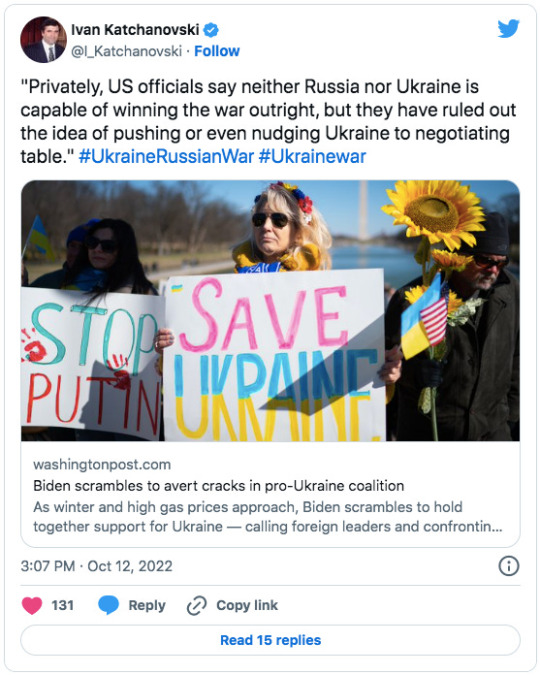
This attitude from the empire is not a new development. Last October The Washington Post reported that “Privately, U.S. officials say neither Russia nor Ukraine is capable of winning the war outright, but they have ruled out the idea of pushing or even nudging Ukraine to the negotiating table.”
Now why might that be? Why would the western empire be so comfortable encouraging Ukrainians to keep fighting when it knows they can’t win?
We find our answer in another Washington Post article titled “The West feels gloomy about Ukraine. Here’s why it shouldn’t.”, authored last week by virulent empire propagandist David Ignatius. In his eagerness to frame the floundering counteroffensive in a positive light for his American audience, Ignatius let slip an inconvenient truth:
“Meanwhile, for the United States and its NATO allies, these 18 months of war have been a strategic windfall, at relatively low cost (other than for the Ukrainians). The West’s most reckless antagonist has been rocked. NATO has grown much stronger with the additions of Sweden and Finland. Germany has weaned itself from dependence on Russian energy and, in many ways, rediscovered its sense of values. NATO squabbles make headlines, but overall, this has been a triumphal summer for the alliance.”
Anyone who believes this proxy war is about helping Ukrainians should be made to read that paragraph over and over again until it sinks in. The admission that the US-centralized power structure benefits immensely from this proxy conflict is revealing enough, but that parenthetical “other than for the Ukrainians” aside really drives it home. It reads as though it was added as an afterthought, like “Oh yeah it’s actually kind of rough on the Ukrainians though — if you consider them to be people.”
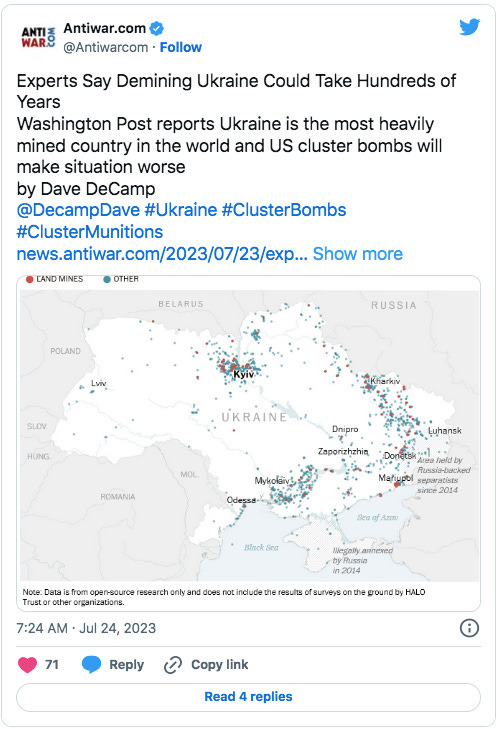
The claim that this war is about helping Ukrainians has been further undermined by another new Washington Post report that Ukraine is now more riddled with land mines than any other nation on earth, and that US-supplied cluster munitions are only making the land more deadly.
That’s right kids! We’re turning Ukraine into an uninhabitable wasteland of death and dismemberment to save the Ukrainians.
We should probably talk more about the fact that the US empire is loudly promoting the goal of achieving peace in Ukraine by defeating Russia while quietly acknowledging that this goal is impossible. This is like accelerating toward a brick wall and pretending it’s an open road.
The narrative that Russia can be beaten by ramping up proxy warfare against it makes sense if you believe Russia can be militarily defeated in Ukraine, but the US empire does not believe that Russia can be militarily defeated in Ukraine. It knows that continuing this war is only going to perpetuate the death and devastation.
“Beat Putin’s ass and make him withdraw” sounds cool and is egoically gratifying, and it’s become the mainstream answer to the problem of the war in Ukraine, but nobody promoting that answer can address the fact that the ones driving this proxy war believe it’s impossible. In fact, all evidence we’re seeing suggests that the US is not trying to deliver Putin a crushing defeat in Ukraine and force him to withdraw, but is rather trying to create another long and costly military quagmire for Moscow, as western cold warriors have done repeatedly in instances like Afghanistan and Syria.
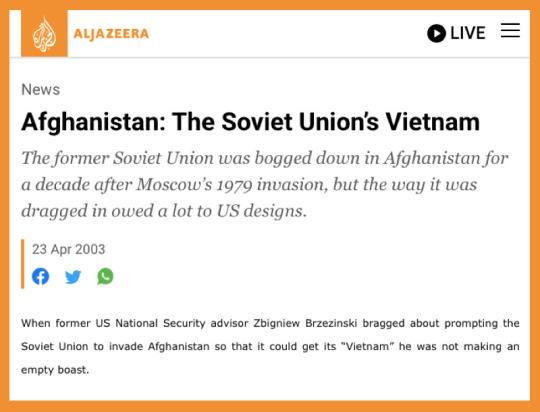
Wanting to weaken Russia and wanting to save lives and establish peace in Ukraine are two completely different goals, so different that in practice they wind up being largely contradictory. Drawing Moscow into a bloody quagmire means many more people dying in a war that drags on for years, with all the immense human suffering that that entails.
The US does not want peace in Ukraine, it wants to overextend Russia, shore up military and energy dominance over Europe, expand its war machine and enrich the military-industrial complex. That’s why it knowingly provoked this war. It’s posing as Ukraine’s savior while being clearly invested in Ukraine’s destruction.
It is not legitimate to support this proxy war without squarely addressing this massive contradiction using hard facts and robust argumentation. Nobody ever has.
#caitlin johnstone#ukraine conflict#us imperialism#nato#nato propaganda#ukraine#russia#united states
346 notes
·
View notes